Theater Reviews – In the Glassy Margents
“My large kingdom for a little grave”: Druid Theatre Company’s Henriad at Lincoln Center
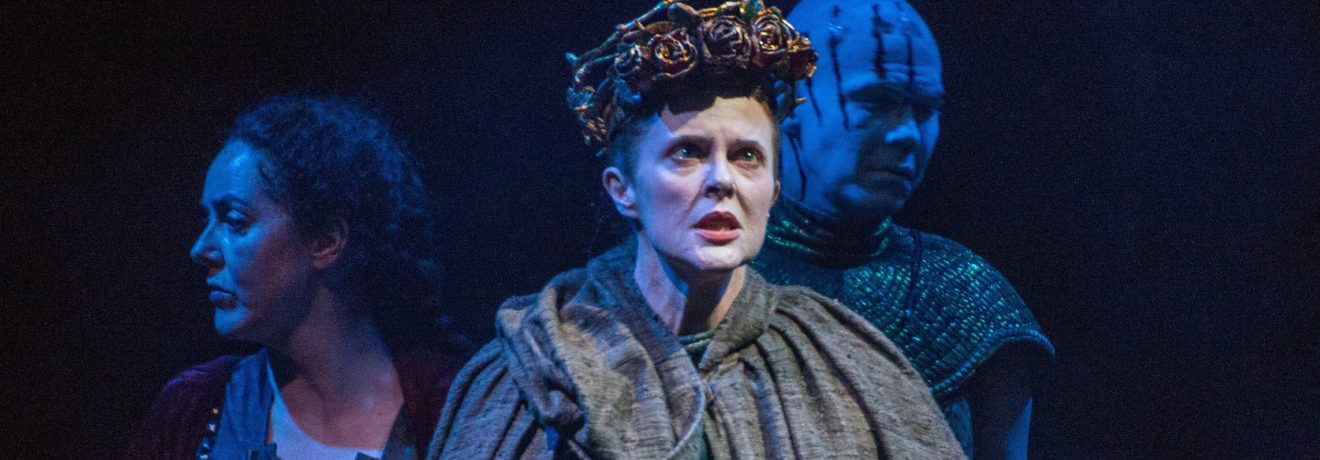
A gravedigger working by a mound of dirt upstage left; the entire stage floor covered in a layer of peaty soil; a skull encircled by a crown of thorns that will soon adorn the heads of the royal protagonists: the memento mori that greet the audience at DruidShakespeare: The History Plays do not merely emphasize that “uneasy lies the head that wears the crown” (2 Henry IV 3.1.31) or focus our attention on “sad stories of the death of kings” (Richard II 3.2.152).[1] Rather, the opening mise-en-scène speaks to a deep skepticism of heroism and a determination to remember that the internecine conflicts that hinge on the caprices of nobility and royalty have real and tragic consequences for those who never set foot in a royal court and know not why they fight and die. This is a production that alongside its riveting depictions of the machinations, performances, and dangers of power remembers the titleless “all other men” (Henry V 4.8.99) caught up in the maelstrom of history. The mound by which the gravedigger works will, after each break between plays, become adorned with an increasing number of white crosses — a reminder of the costs of supposedly divinely appointed power, as well as a statement on its ultimate absurdity in the face of the end that awaits both kings and beggars.
This visceral, fast-paced, and clear-eyed production of Shakespeare’s second tetralogy — Richard II, both parts of Henry IV, and Henry V — by Galway’s Druid Theatre Company came to the Gerald W. Lynch theater at John Jay College in July 2015 as part of Lincoln Center Festival after a lauded run in Ireland. Under the direction of Garry Hynes, a Druid Company founder, and running at seven hours with three intermissions (there was also an option on weeknights to see the plays over two approximately three-and-a-half-hour installments), Druid manages to charge through the plays at an electrifying pace with exceptional clarity and force, and yet simultaneously to engage themes and ideas with depth and subtlety. Thirteen actors take on all the roles, and the company employs gender-blind casting. The genders of the characters are not changed, but the women playing men’s roles, including Bolingbroke/Henry IV and Hal/Henry V, do not conceal their gender. As Hynes said, “It is not an act of disguise. They don’t impersonate men…. You’re perfectly aware that they’re women.”[2]
Each play runs about ninety minutes, except for the second part of Henry IV, which is handled in an hour even, and no doubt the extent of the excising of the playtexts will disappoint some. Substantial editing is, of course, necessary if one is aiming to complete the performance in a single day without taxing actors (and spectators) beyond reason. Irish playwright Mark O’Rowe’s cuts are ruthless and unsentimental, and they produce an enthralling speed and a sense of inevitable propulsion toward destruction, though enough of the carnivalesque comedy of the Boar’s Head remains to stand as powerful contrast to history’s elite players and their endless, often-obscure, and always-bloody disputes. It’s not that a viewer won’t miss certain speeches or moments that have been cut — Hal’s “I know you all” soliloquy, Falstaff’s catechism on honor, Hotspur’s interactions with his wife Kate and his argument about superstition with Glendower (the latter two characters are entirely absent here), to name just a few — but it is only afterward that you piece together what was missing, and in the meantime the production has been so alive and articulate that it would be churlish to linger on absences. O’Rowe does fine work, not only cutting but rearranging, and even altering lines or creating transitions between truncated scenes. The actors, in their Irish voices, speak Shakespeare’s language with incredible vigor and lucidity. Walking out of DruidShakespeare after seven hours I felt not exhausted but enlivened, thinking of W. H. Auden’s comment on Henry IV, which could easily be applied to the entire tetralogy, “It is difficult to imagine that a historical play as good as Henry IV will ever again be written.”[3] Druid leaves its mark on Shakespeare while allowing his brilliance to shine.
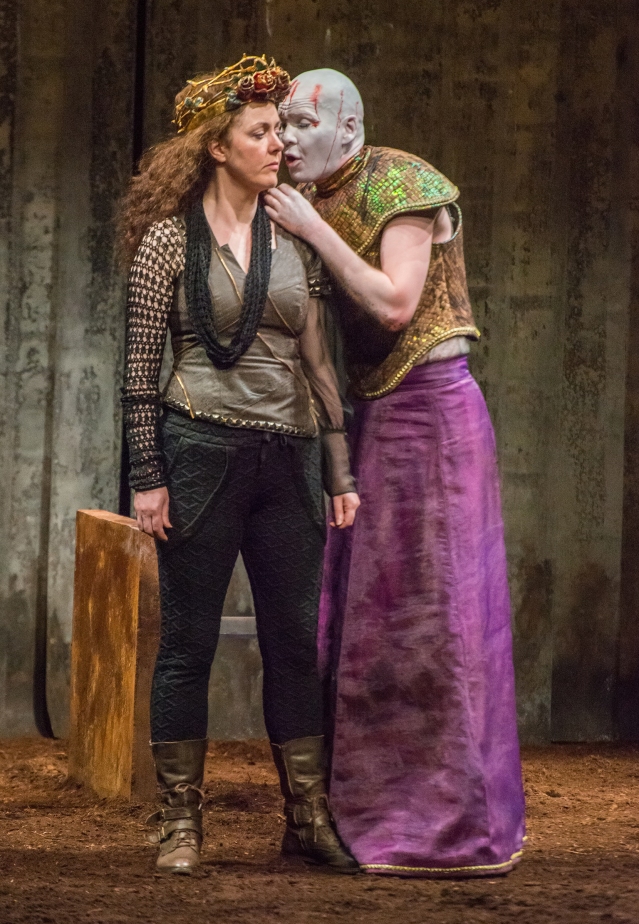
Photo Credit: ©Stephanie Berger.
When Marty Rea takes the stage as Richard II he is ceremoniously crowned and sceptered, focusing our attention on the symbols of royal authority that are both so invested with meaning and proven to be utterly meaningless. This Richard stands apart from the other characters, however, due to more than his title and royal accoutrements. In physical appearance he evokes an ethereal, androgynous otherness, his bald head and face painted a ghostlike white, his clothing an array of colorful robes that contrast sharply with the austere, muted wools and leathers of the courtiers. His temperament is highly mercurial, conveying an almost-childlike fickleness, one moment giggling at his own wit, the next nearly strangling an ill but disobedient Gaunt (Bosco Hogan, who, as so many characters do at one point or another, ends up prostrate on the dirt — characters rarely sit in this production, and there are no beds even for death scenes such as Gaunt’s or Henry IV’s).
The opening dispute between Mowbray (Aaron Monaghan) and Bolingbroke (Derbhle Crotty) is substantially cut down, and rather than explore the issue of Woodstock’s murder and Richard’s possible collusion, the scene is meant to highlight Richard’s lack of sound advisors and his erratic decision-making. Following a whisper in his ear by Bagot (Rory Nolan), who very much controls the young, whimsical king, he banishes Bolingbroke for ten years, and then suddenly alters the banishment to six years after he sees Gaunt’s tears. Richard’s heedlessness becomes catastrophically apparent in his annexing of Gaunt’s estate to fund his misguided adventures in Ireland. Rea thoroughly captures the flaws in Richard’s kingly style: he is completely detached from practical concerns and unwilling to question the consequences of his decisions since he puts such faith in his divinely sanctioned mandate: “Not all the water in the rough rude sea / Can wash the balm from an anointed king. / The breath of worldly men cannot depose / The deputy elected by the Lord” (3.2.50–3). Richard’s error is that he believes the lie that is intended, rather, to be cynically used to legitimate his authority. Just as the thorny crown in this production draws blood from Richard’s stark-white head, so the myth of kingship injures him beyond repair.
The prickly crown won’t be much kinder to Henry IV, but for now Derbhle Crotty’s astute, cocksure Bolingbroke, assisted by Hotspur (Garrett Lombard) and Northumberland (Marie Mullen, terrific also as the Lord Chief Justice in 1 and 2 Henry IV), moves through the play like an unstoppable force, upending not only Richard’s kingship but his very identity. Bolingbroke is, in many ways, a deeply enigmatic figure, and Shakespeare gives him no soliloquies and thus audiences no access to his inner life. At what point does his plan change from reclaiming his title and lands to deposing Richard and seizing the throne despite no legal claim? Does he craftily hide his true intent and act the master Machiavel, or rather allow the sweep of history and circumstance (not to mention Richard’s deep self-destructiveness) to plant him in the throne? He seems to be prepared to invade England before news of Richard’s confiscation of the Lancaster estate could have reached him (2.1.278–90), yet insists that his rightful inheritance is his only motivation. Richard is a master performer who entirely hijacks the deposition scene, which Rea plays with exquisite, biting sarcasm, bordering on the hysterical yet totally in control; but ironically it is Bolingbroke who understands the performance of power in order to woo the commons, as Richard laments: “Ourself … / Observed his courtship to the common people, / How he did seem to dive into their hearts / With humble and familiar courtesy … / Wooing poor craftsmen with the craft of smiles” (1.4.22–7). Crotty’s performance cultivates these ambiguities in Bolingbroke, and she allows his self-assurance and steeliness to fray just slightly during the deposition scene and at the end when he is presented with Richard’s corpse, not “within this coffin” (5.6.30), but tossed at his feet and sprawled on the soil in which it will shortly be buried.
In losing his crown and scepter Richard has lost his symbolic identity, and this unmasking is beautifully portrayed on stage. In the deposition scene Rea holds up the looking-glass with his back to the audience so we see his ghostly reflection as he speaks of the self he no longer recognizes. Later, in his prison cell alone, Richard washes his face in a bowl of water, rubbing off the white paint — and thus his former identity — that has covered him during the entire production. If this is a quasi-baptism, what will Richard be reborn as? If he isn’t a king, if the myths that sustained him were false, who or what is he? As he says earlier, “Alack the heavy day, / That I have worn so many winters out / And know not now what name to call myself! / O, that I were a mockery king of snow, / Standing before the sun of Bolingbroke / To melt myself away in water-drops!” (4.1.247–52). This hysterical break, this loss of a coherent identity, has transformed the spoiled, fickle, callous young king into a lyric poet who plumbs the depths of his self with piercing insistence. The practical, materialist Bolingbroke, now Henry IV, may not be consumed by such metaphysical niceties, but the play ends with an image of cleansing that recalls Richard in his cell: “I’ll make a voyage to the Holy Land / To wash this blood off from my guilty hand” (5.6.49–50).
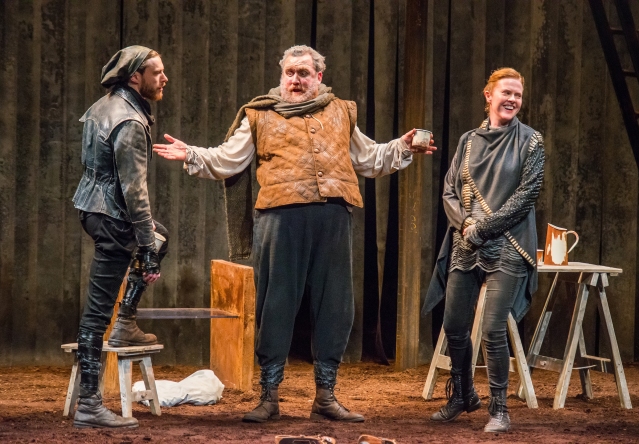
Photo Credit: ©Stephanie Berger.
The two parts of Henry IV feature an outstanding performance by Rory Nolan as Sir John Falstaff. Though criticized by some for making Falstaff too likable, this seems more a product of textual editing than any flaw in Nolan’s portrayal: missing are Sir John’s more nihilistic moments, including his recruitment of poor soldiers who are, in his words, “good enough to toss; food for power, food for powder; they’ll fill a pit as well as better” (1 Henry IV 4.2.58–9). But also, we might ask, what is wrong with a likable Falstaff? The postmodern ethos is that everything must be dark and anti-heroic (and there’s plenty of that in these productions), but Nolan’s Falstaff is the one William Hazlitt envisioned: “Falstaff’s wit is […] an exuberance of good-humour and good-nature; an overflowing of his love of laughter, and good-fellowship. […] He is represented as a liar, a braggart, a coward, a glutton, &c., and yet we are not offended but delighted with him; for he is all these as much to amuse others as to gratify himself. […] The unrestrained indulgence of his own ease, appetites, and convenience, has neither malice nor hypocrisy in it. In a word, he is an actor in himself.”[iv] After the Gadshill robbery — which is wonderfully done on a dark stage with flashlights — when Hal (Aisling O’Sullivan) and Poins (Gavin Drea) coax exaggerations out of Falstaff over the number of men he fought, Nolan expertly gets the laughs that this scene always generates, but also wryly captures Hazlitt’s sense of Falstaff as “actor in himself”: he knows exactly what he is doing, performing for Hal and Poins, as well as Bardolph (an excellent Clare Barrett), Peto (Charlotte McCurry), and Mistress Quickly (John Olohan), using his cowardice and lies to enhance the merriment and solidarity of the group. At the same time, we sense that it is a group over which Sir John has lost control as things head inexorably toward his renunciation and the general destruction of the comic world in Henry V. One unsuccessful decision in the comic scenes, I thought, was the depiction of Mistress Quickly. John Olohan’s performance was competent and occasionally moving, but wearing a crinoline without the skirt and with flowers in his beard, the effect was absurdist camp, which was not in sync with the rest of the comic characters.
I was unsure what to make of O’Sullivan’s unfeeling, black-clad Hal at first, with her at-times growling or flat voice (perhaps straining to seem masculine) and apparent lack of even a hint of sympathy for anyone, including Falstaff. As did Richard, she conveyed a difference, an apartness from the other characters, which is of course appropriate to the character’s circumstances, but which initially seemed overly remote. But beginning with the play within the play when Hal and Falstaff impersonate Hal and Henry IV, I began to appreciate O’Sullivan’s alienation: she allowed Hal to betray affection for Falstaff in the moments of misrule while wearing the pillow crown, and then perfectly pulled off the foreboding “I do, I will” (1 Henry IV 2.4.481), after which I recalled Bloom’s phrase that Hal’s ambivalence “has resolved itself into a murderous negativity.”[v] The “I know you all” soliloquy was not necessary for O’Sullivan to ably convey the deep cynicism that runs in Hal, and perhaps even the frightening emptiness: “Hal has no self,” as Auden wrote.[vi] He has the qualities that will make an effective king, but in the world of DruidShakespeare, that may not be a good thing. Interestingly, the throne remains on stage during the tavern scenes: everything is colored by the imperatives of kingship. The rejection of Falstaff makes effective use of the scaffolding above the stage, as Shallow and others look down as Henry V, newly crowned and followed only by the Lord Chief Justice, casts his former companion off in particularly harsh terms — this machine-like Henry gives us no twinge of regret or hesitation. The price, however, for lessening the emotional bond between Hal and Falstaff, is to lessen the impact of the scene of Falstaff’s rejection.
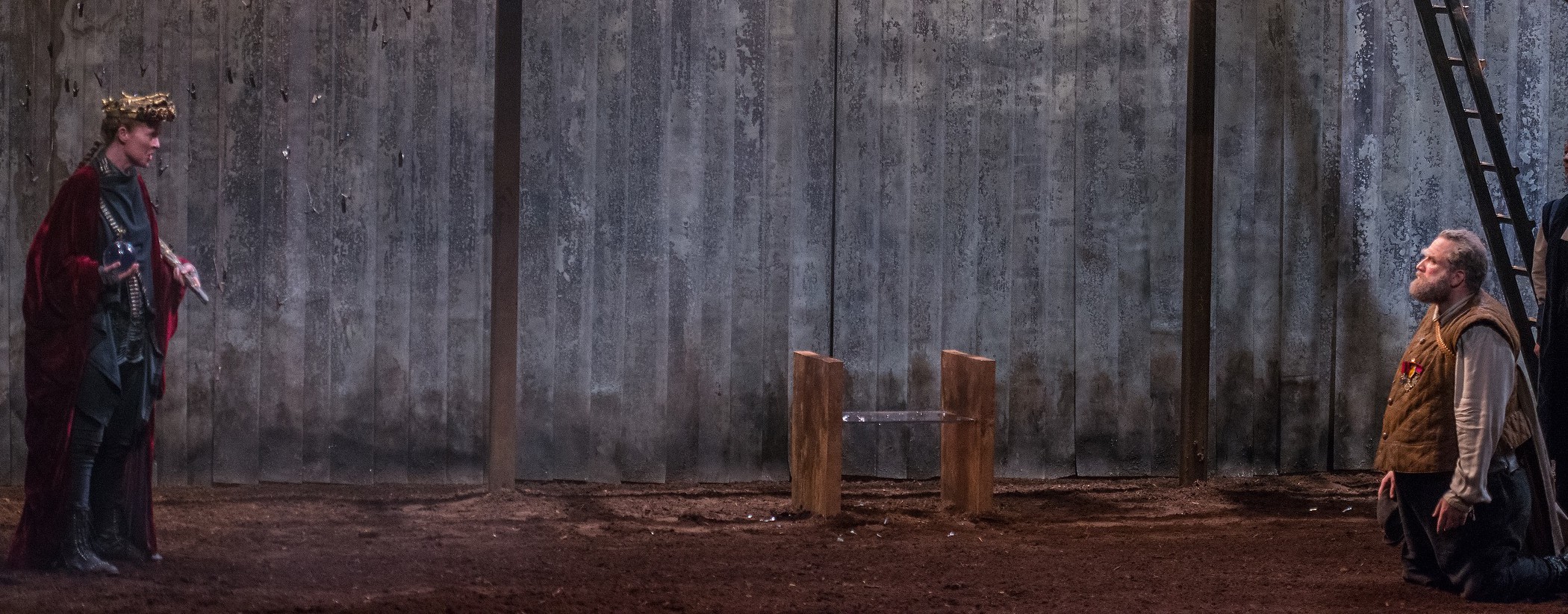
Photo Credit: ©Stephanie Berger.
The scenes between Hal and Henry IV had a taut efficiency, as did the plotting of the rebels, while the cleverly choreographed battle scene, including a kind of slow-motion chaos in which actors are moving in and out from a plastic draping at the back of the stage, demonstrated the exquisite design, lighting, and sound that is evident throughout the entire production.
In the second part, Henry IV appears hunched over and uses a cane to walk; he is also ravaged by a skin disease apparent on his body and face. It is as though the crown, which has been a burden from his first moments as king in Richard II, and which he acknowledges having obtained by “indirect crook’d ways” (2 Henry IV 4.3.312), is itself a disease passed from one character to the next. In his final moments, Henry lies on the earthen stage, leaning against the throne and grasping the thorny crown, at one time the ultimate objects of desire. One of the benefits of seeing the Henriad in one sitting is that in these moments we clearly remember just a couple of hours earlier the confident Bolingbroke and the forsaken Richard, and Druid always reminds us of that recent past, too: in Henry V, for example, the king has a hint of Richard’s otherworldly pallidness, and the ghosts of Richard and Henry IV will appear behind Henry as he weighs the responsibilities of kingship.
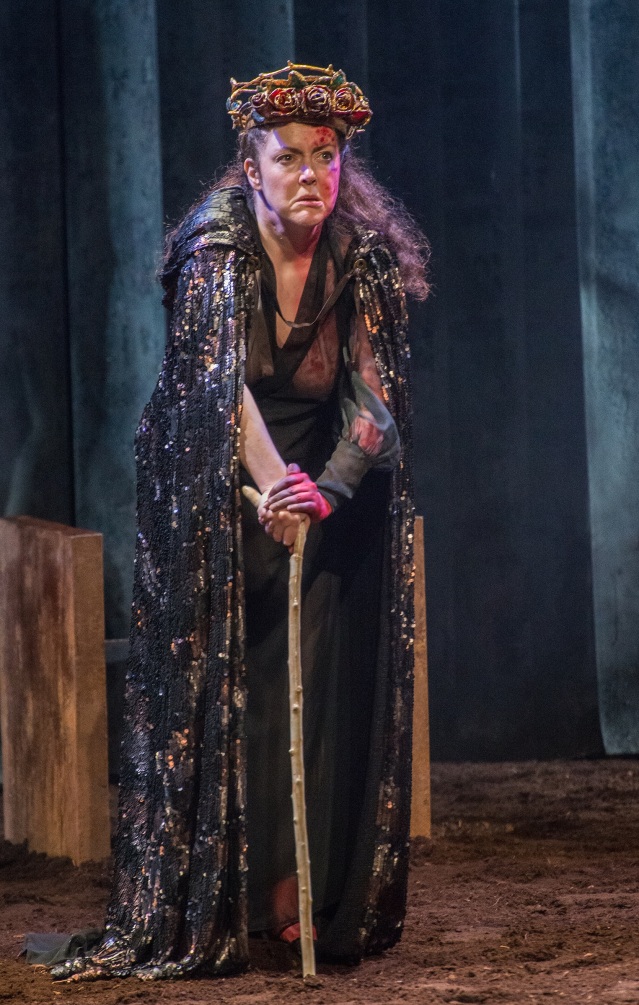
Photo Credit: ©Stephanie Berger.
The Chorus (Aaron Monaghan), who gets the final installment of the evening started, is the same actor who had been digging a grave five and a half hours earlier. The mound he had been working by was now full of crosses, but of course many more could be erected after Henry V, one of the most hotly debated plays in the canon. Simply put, Henry the cynical, amoral war criminal, or Henry the model Christian prince and English hero? Druid’s Henry certainly isn’t the latter— clearly it leans toward the anti-heroic interpretation—but their take on the play doesn’t let us off with a simple answer. What makes the performance so effective, and thrilling, is that it doesn’t shy away from the moments of Henry’s magnetism, achieved through his masterful use of rhetoric and done with brutal energy by O’Sullivan. The ferocity of her rebuttal of the French gift of tennis balls had the audience laughing as the French ambassador tried to recover, and the rain-soaked Agincourt and her rendition of the Crispin Day speech had members of the audience ready to follow her into battle.
But the production does not attenuate the moments of intrigue, horrific violence, and pessimism. Having just seen Richard II unmoored as Shakespeare made mockery of divine right, we now have Henry allowing the Church’s incredibly strained and arcane justification for war to morph quickly into his repeated insistence that God is on his side in a just and necessary cause, revealing an almost staggering hypocrisy. The threats at Harfleur are rendered in all their fury (Olivier, in his heroic film, famously cut this moment of Henry promising the murder of babies and the rape of women), and the order of the mass execution of the French prisoners of war is included, which even Branagh, supposedly offering a darker, post-Vietnam take on the play, decided to cut from his film. In the hanging of Bardolph, which is often a deeply sentimentalized moment (again, see Branagh), although the text offers no indication that Henry hesitates or feels any remorse, O’Sullivan does offer a brief inward moment of silence before coldly uttering “We would have all such offenders so cut off” (3.6.98).
There is comedy amid the warfare, of course, led by a limping but still spirited Pistol (Aaron Monaghan) and a hilarious rendition of Nym by Charlotte McCurry, who punctuates his tagline, “and that’s the humour of it,” with an endearing physical tic. And Druid also plays the French solely for laughs: all the conversations among the French aristocrats (who wear turquoise capes) are done as a kind of effete fencing dance, with various slashes of the foil as punctuation, a conceit that had the audience in stitches.
But there is a dark end for the comic characters, who wind up dead or destroyed, including Falstaff’s page, whose throat we see slit while he guards the luggage. O’Rowe’s decision for how to end the evening did not sit well with some critics, though I think it made perfect sense given the thrust of the production: instead of Henry’s point of view getting the triumphant last word, O’Rowe transplants an early scene of the play, that of Mistress Quickly, Pistol, Bardolph, Nym, and the boy mourning Falstaff (2.3 in the text), to the very end, upsetting chronology but realigning the emotional focus. And so these characters, casualties of Henry’s adventures in France who in some cases we have seen killed on stage, return to remind us of the human cost of royal prerogatives. After Mistress Quickly has eulogized Falstaff and Pistol says “Let us to France,” leaving for a war we have already seen take place, there is poignancy in knowing this group will never meet again. Druid won’t let us forget the casualties of war. And I think this is, more than anything, what makes this Irish or postcolonial Shakespeare (terms used to describe the production). They chose not to highlight the Irish elements of Shakespeare’s texts — the Irish character Macmorris from Henry V is cut entirely, for example, though we still hear Richard II curse the “rough rug-headed kerns” (2.1.157) — and there is no radical appropriation or didactic heavy-handedness. Rather, there is this commitment to emphasize those without power who are entangled in the ambitions of English kings. Returning again to Auden, “the not so innocent children, Bardolph, Pistol, and Nym […] are drawn into history, and suffer.”[vii]
While this 40th anniversary year for Druid was the first time they undertook Shakespeare, they have said it will not be their last engagement with the Bard. We can all be grateful for that.

Photo Credit: ©Stephanie Berger.
[1] All citations to the plays are from The Norton Shakespeare, ed. Stephen Greenblatt et al. (New York: W. W. Norton and Company, 1997).
[2] New York Times, “Druid Theatre Company Makes Shakespeare’s Histories Its Own,” Alexis Soloski interviewing Garry Hynes, 1 July 2015.
[3] Auden, Lectures on Shakespeare, ed. Arthur Kirsch (Princeton: Princeton University Press, 2000), 101.
[iv] Hazlitt, Characters of Shakespeare’s Plays (New York: Wiley and Putnam, 1845), 123–4.
[v] Harold Bloom, Shakespeare: The Invention of the Human (New York: Riverhead Books, 1998), 272.
[vi] Auden 108.
[vii] Ibid., 112.
Article Keywords: Bolingbroke, druidshakespeare, Falstaff, Garry Hynes, Hal, henry iv, lincoln Center, Richard II, shakespeare.
